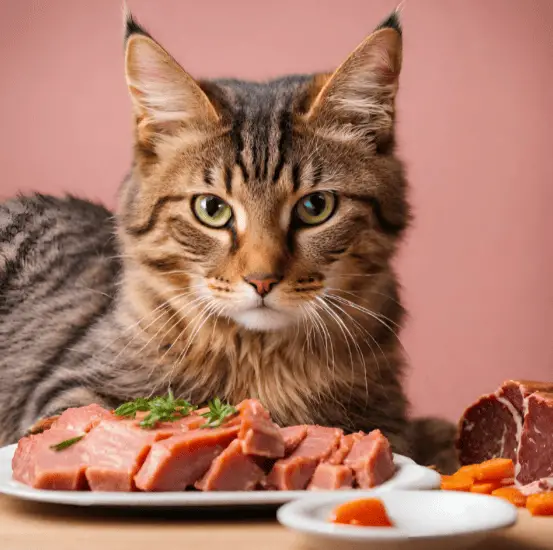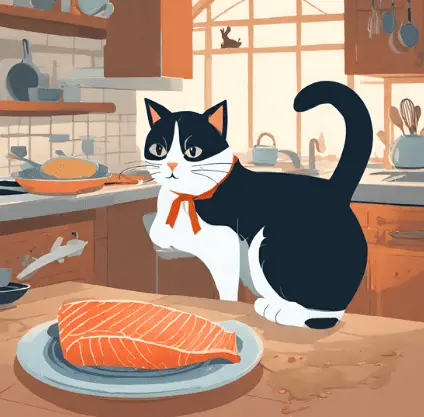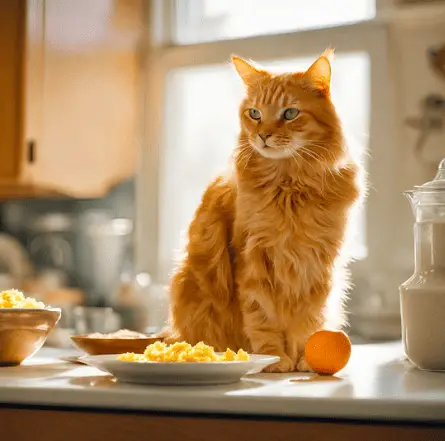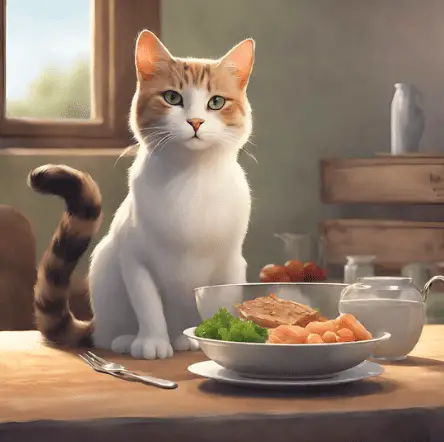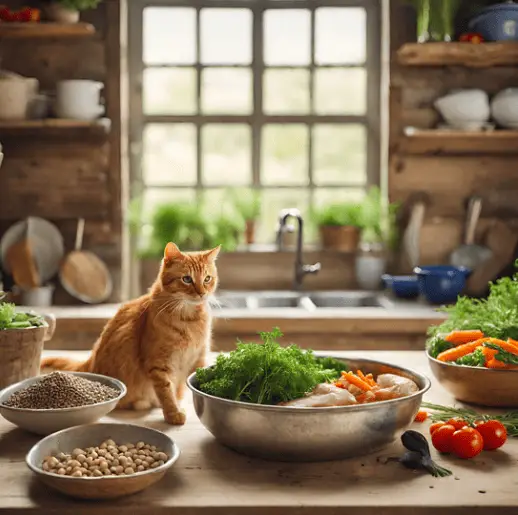
When it comes to feeding my cat, I want to make sure I’m doing what’s best for their health. So, I wondered, can I just give them cooked meat?
In this article, we’ll explore the potential risks of feeding cats cooked meat, the nutritional needs of our feline friends, and the benefits of a balanced raw meat diet.
We’ll also discuss cooking methods that preserve nutrients, proper food handling, and the importance of consulting with a veterinarian for a safe transition.
Let’s dive in!
KEY TAKEAWAY
Can I just feed my cat cooked meat?
While cooked meat can be part of a cat’s diet (1), consult a vet for a nutritionally complete plan.
The Potential Risks of Feeding Cooked Meat to Cats
I should be cautious about feeding my cat cooked meat due to the potential risks involved. While it may seem like a convenient option, there are several reasons why cooked meat may not be the best choice for my feline friend.
One of the main concerns is the loss of vital nutrients during the cooking process. Cats have specific dietary requirements, and their bodies are adapted to consume raw meat. Cooking meat can lead to the denaturation of proteins and the destruction of essential vitamins and minerals, which are crucial for their overall health and wellbeing.
Moreover, cooked meat may also pose a risk of bacterial contamination. Raw meat can harbor harmful bacteria such as Salmonella or E. coli, which can cause severe gastrointestinal issues for cats. Cooking the meat may kill these bacteria, but it doesn’t eliminate the risk entirely. Cross-contamination during the preparation process or improper storage can still lead to the presence of harmful bacteria in cooked meat.
To ensure the best possible nutrition for my cat, it’s important to understand their specific dietary needs. Transitioning into the subsequent section about understanding the nutritional needs of cats, it’s crucial to provide a balanced diet that meets their requirements for proteins, fats, vitamins, and minerals.
Understanding the Nutritional Needs of Cats
Understanding the nutritional needs of cats is essential for providing them with a balanced and healthy diet. Cats are obligate carnivores, which means that they require certain nutrients that can only be found in animal tissues. These nutrients include essential amino acids, such as taurine, arachidonic acid, and vitamin A, which are crucial for their overall health and well-being.
Cats also have specific requirements for protein, fat, and certain vitamins and minerals. Protein is important for muscle growth and maintenance, while fat provides a concentrated source of energy. Cats also need certain vitamins, such as vitamin D and niacin, as well as minerals like calcium and phosphorus, for optimal health.
Feeding cats a balanced raw meat diet can provide them with the necessary nutrients they need. Raw meat is a natural source of protein and essential amino acids, making it an ideal choice for cats. Additionally, raw meat provides enzymes and other beneficial substances that can support their overall digestive health.
Benefits of a Balanced Raw Meat Diet for Cats
Feeding cats a balanced raw meat diet provides them with essential nutrients (2), while also promoting their overall health and well-being. Raw meat contains vital nutrients such as amino acids, fatty acids, vitamins, and minerals that are essential for a cat’s growth and development, which is why homemade cat food recipes utilizing raw meat can be beneficial. These nutrients play a crucial role in maintaining healthy skin and coat, supporting a strong immune system, and ensuring proper organ function.
One of the main benefits of a raw meat diet for cats is that it closely resembles their natural diet in the wild. Cats are obligate carnivores, meaning they require a diet primarily consisting of animal protein. Raw meat provides cats with the necessary protein, as well as taurine, an essential amino acid that’s abundant in animal tissues but not present in plant-based foods. Taurine is crucial for a cat’s heart health, vision, and reproductive system.
Furthermore, a balanced raw meat diet can help prevent certain health issues in cats. It has been shown to reduce the risk of obesity, diabetes, and urinary tract problems. This is because raw meat diets are generally low in carbohydrates and contain a higher moisture content, which can aid in maintaining a healthy weight and proper hydration.
It is important to note that handling raw meat requires proper hygiene to minimize the risk of bacterial contamination, both for the cat and the humans involved. Cats’ digestive systems are designed to handle potential pathogens in raw meat, but precautions must still be taken to ensure food safety.
Cooking Methods That Preserve Nutrients in Meat for Cats
When cooking meat for my cat, I always use methods that preserve the nutrients, such as grilling or baking, to ensure they receive the essential vitamins and minerals they need. Here are four reasons why these methods are beneficial for their health:
- Retains essential nutrients: Grilling or baking meat for cats helps to retain important nutrients like protein, vitamins, and minerals. These nutrients are vital for their overall well-being and support various bodily functions, including a healthy immune system and strong muscles.
- Minimizes nutrient loss: High-heat cooking methods like grilling and baking help to minimize nutrient loss compared to other methods like boiling or frying. This means that the cooked meat retains more of its nutritional value, ensuring your cat gets the maximum benefit from their meal.
- Enhances flavor and texture: Grilling or baking meat can enhance the flavor and texture, making it more appealing to your cat. This can be especially beneficial if your cat is a picky eater or has specific dietary requirements.
- Reduces the risk of foodborne illnesses: Properly grilling or baking meat for your cat reduces the risk of foodborne illnesses caused by bacteria or parasites. Cooking at high temperatures helps to kill harmful pathogens, ensuring the safety of your cat’s meal.
Proper Food Handling and Storage for Cooked Meat Diets
By refrigerating leftover cooked meat promptly, I ensure the safety and quality of my cat’s diet. Proper food handling and storage are essential when it comes to feeding our feline companions a cooked meat diet.
Just like humans, cats are susceptible to foodborne illnesses caused by bacteria such as Salmonella and E. coli. To prevent these risks, it’s crucial to follow evidence-based guidelines.
After cooking the meat, I make sure to cool it down quickly to minimize bacterial growth. This can be done by placing the meat in a shallow container and refrigerating it within two hours of cooking. By doing so, I inhibit the growth of harmful bacteria that can cause food poisoning.
When storing leftover cooked meat, I always keep it in an airtight container or wrap it tightly in foil or plastic wrap. This prevents cross-contamination with other foods and helps maintain the quality of the meat. Additionally, I label the container with the date to ensure I use it within a safe timeframe.
Furthermore, I’m careful not to keep cooked meat for too long. Leftovers should be consumed within 3-4 days to ensure freshness and minimize bacterial growth. If I’m unable to use the meat within this timeframe, I freeze it to extend its shelf life.
Transitioning Your Cat to a Cooked Meat Diet Safely
I ensure my cat’s safety by gradually introducing cooked meat into their diet, allowing them to transition safely. This careful approach is crucial to preventing any digestive issues or nutritional imbalances that could harm my feline companion. Here are four important reasons why I take this approach:
- Digestive Health: Cats have sensitive stomachs and sudden changes in their diet can lead to gastrointestinal upset, such as vomiting or diarrhea. By gradually introducing cooked meat in the right proportions, like determining how much cooked food for cats is appropriate, I allow their digestive system to adjust slowly, minimizing any potential discomfort.
- Nutritional Balance: Cats have specific dietary requirements, including essential nutrients like taurine, arachidonic acid, and vitamin A. A sudden switch to a solely cooked meat diet may not provide all the necessary nutrients. By transitioning gradually, I can ensure that my cat’s nutritional needs are met.
- Food Allergies: Cats can develop allergies to certain ingredients, including different types of meat. By introducing cooked meat gradually, I can monitor any potential allergic reactions and identify which types of meat are well-tolerated by my cat.
- Behavioral Adjustment: Cats can be creatures of habit, and sudden dietary changes can cause stress or behavioral issues. Gradual transition helps them adapt to the new diet more comfortably, reducing any potential negative impact on their behavior.
Consulting With a Veterinarian About Cooked Meat Diets for Cats
Have you consulted with a veterinarian about the safety and nutritional adequacy of cooked meat diets for cats? It’s crucial to seek professional advice before making any significant changes to your cat’s diet. While cooked meat can be a part of a cat’s diet, it’s important to ensure that it’s nutritionally balanced and meets their specific needs.
Cooked meat alone may not provide all the necessary nutrients that a cat requires. Cats are obligate carnivores, meaning they require certain nutrients found only in animal tissue, such as taurine and arachidonic acid. These nutrients are easily obtained from a balanced commercial cat food diet. When considering options like homemade vs commercial cat food, it’s important to supplement homemade diets with essential nutrients to avoid deficiencies.
Consulting with a veterinarian will ensure that you’re providing the right quantity and quality of cooked meat for your cat. They can guide you on the appropriate cooking methods to minimize nutrient loss and the risk of bacterial contamination. Additionally, they can help you determine the ideal balance of meat, organ meats, and other necessary components to meet your cat’s unique nutritional needs.
Conclusion
In conclusion, while it may be tempting to feed cooked meat to your cat, it’s important to consider the potential risks and nutritional needs of cats.
A balanced raw meat diet can provide numerous benefits for cats, but if you choose to cook the meat, certain methods can help preserve essential nutrients.
It’s crucial to handle and store cooked meat properly to avoid contamination.
As always, consult with a veterinarian to ensure your cat’s dietary needs are met.

Stephanie Ansel is a well-known writer and journalist known for her unique and captivating writing style. She has written many articles and books on important topics such as the lifestyle, environment, hobbies, and technology and has been published in some of the biggest newspapers and magazines. Stephanie is also a friendly and approachable person who loves to talk to people and learn about their stories. Her writing is easy to read and understand, filled with lots of details and information, and is perfect for both kids and adults who want to learn about important topics in an interesting way.

